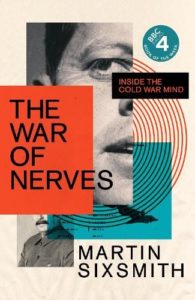 …the Russian psyche, forged through centuries of abuse by the country’s rulers and enemies alike, is not “like us”…
…the Russian psyche, forged through centuries of abuse by the country’s rulers and enemies alike, is not “like us”…
I borrowed The War of Nerves:Inside the Cold War Mind thinking it was going to be about spies, but it was really about fear. The arms race between the USSR and the US took the world to the brink of destruction. East and West lived for decades in a state of mutual incomprehension, misunderstanding, mistrust and paranoia that nearly killed us all.
After millions of Soviets suffered and died defeating the Germans in WWII, there was a brief honeymoon of gratitude for their enormous sacrifice…but then the West (particularly the US) managed to pretty comprehensively stomp all over their sensitivities. Thus, East Berlin and the Wall and the Iron Curtain.
Fearmongering, as we know from our recent experiences here – looking at you, John Howard et al – is effective but heartless politics. The Soviets feared the that the US was going to attack them; the leaders projected their own experience and psychological understanding onto their counterparts and saw lies, disinformation, dissimulation and conspiracies everywhere. And in the US, with its McCarthy witch hunts and ‘reds under the beds’ campaigns, it was vice versa. Thus when each side suspected the other of planning nuclear strikes, we had ‘brinkmanship’ – a game of ‘chicken’ played with weapons of mass destruction.
Did you know that the WWIII was narrowly averted in 1983? Communist propaganda reinforced the idea that the individual was not to be trusted, that Party protocols or automation were the superior decision-makers. Well, a computerised Soviet early warning system misfired. It was only because Stanislav Petrov, the Russian officer on duty, chose to hang back, re-check and await corroboration instead of blindly following the order to launch that bombs weren’t launched. Whew.
We hear about the big players – Stalin, Churchill, Reagan, Truman, Khrushchev – and high-level international politics but Sixsmith also explores the psychology of the times through personal stories and anecdotes, through art, literature, religion, science, music and popular culture.
The anecdote that has stayed with me is about the Russian cosmonaut Vladimir Komarov, who went knowingly to his death in 1967. Increasingly lagging in the ‘space race’, the Soviet authorities demanded the Soyuz launch go ahead at all costs. All the scientists knew that the ship was not space-worthy; the program had been dogged by technical problems, cost-cutting and time-saving shortcuts. But no-one could tell the authorities because questioning the superiority of Soviet technology amounted to treason. And Komarov knew that if he pulled out, they would instead send his friend and colleague, Yuri Gagarin. So he chose to go, with predictable results.
This is a gripping stuff, and it seems (sigh) like history is repeating. Disinformation, lies and wacky conspiracy theories spread like the plague via social media and Sky commentators. When I was young, it seemed unthinkable that there would ever be another world war but I wonder if we are getting closer and closer to another brink.

It’s so depressing that the human race seems incapable of moving past fear-mongering, lies and mistrust. Can’t we ever learn from our mistakes?
My daughter is a bit obsessed by the space race and the Cold War and has told me that story abut Petrov — I didn’t know about Komarov, though. How sad, how heroic. I was astonished to learn that the USSR was way ahead in the space race right up till the moon landing! I am the victim of American propaganda.